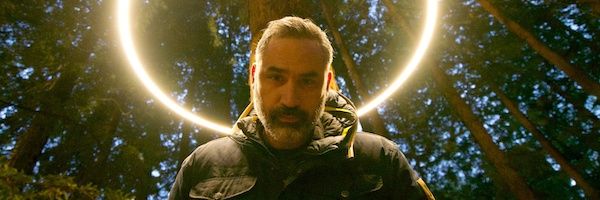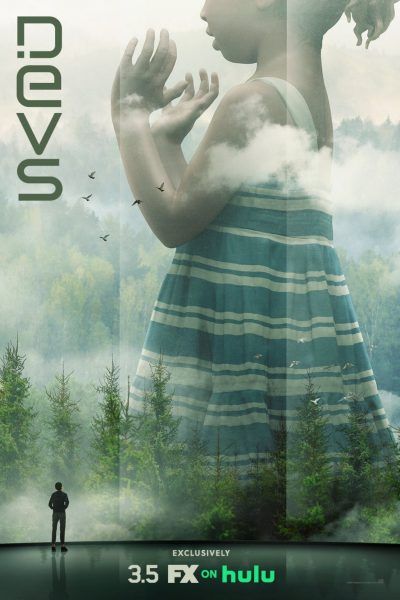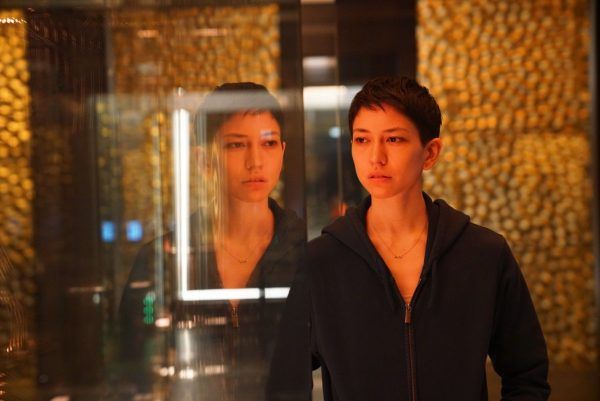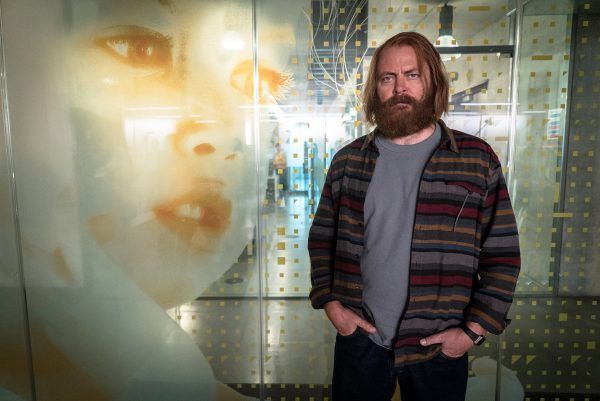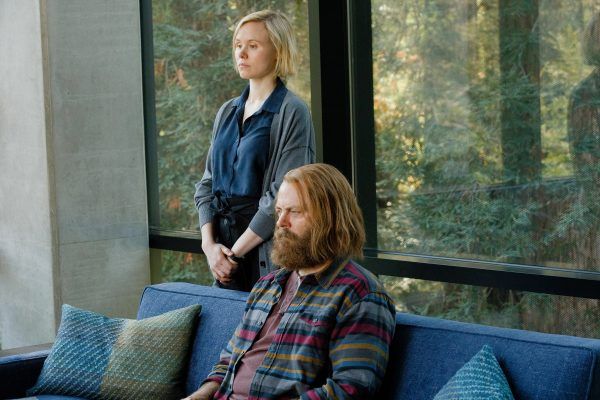From creator/writer/director/executive producer Alex Garland, the limited series Devs, which is available to stream at FX on Hulu, follows software engineer Lily Chan (Sonoya Mizuno), as she tries to investigate the ultra-secretive development division of the cutting-edge tech company that employers her, following the murder of her boyfriend (Karl Glusman). As Lily gets in deeper and the extent of Amaya CEO Forest’s (Nick Offerman) commitment to the Devs project is pushed to the limit, the success of the company’s covert work is threatened, which could result in dire consequences for everyone.
During this 1-on-1 interview with Collider, visionary storyteller Alex Garland talked about using his own vision as a starting point and then collaborating with his creative team, his evolution from novelist to filmmaker, they subject matter he wanted to explore in Devs, how the atmosphere can become more important than dialogue, how he always knows his endpoint in the story and then works to justify it, not wanting to tell an open-ended story, wanting to work with this cast again on a different project (he’s currently writing another limited series about civil disobedience that he’s also hoping will find a home at FX), and his love of HBO’s Succession.
Collider: When you were working on this, did you visually see it? Was this how you conceived of it?
ALEX GARLAND: Yeah. That is to say yes, as a starting point, but then, I have these people who I’ve worked with, a lot of them many times, and they bring themselves to it. The reason that Rob Hardy is a very good DoP is not because he follows the instructions of a director. It’s because he has a beautiful and poetic aesthetic. I think it’s too self-aggrandizing to say, yes, it’s exactly how I imagined it. I imagined it as the starting point, and then the group of people come together and make something better.
As the writer and director on this, when you see something a certain way, is it hard to hand it over and not necessarily have it turn out the way you pictured it?
GARLAND: No. A long time ago, I worked as a novelist, and with a novel, you really do it on your own. It’s you and the page, basically. Film narrative, in television and in cinema, is just not like that. It’s just not how it works. It’s not just you. You are part of a team. And what that team does for me is make it enjoyable. I found novel writing to be not enjoyable. I found it lonely and very isolating, not just for myself, but from the world, somehow. It made me feel disconnected from the world. And film and TV, with this group of people, is sociable. I want to spend time with them, I want their ideas, and I want their humor and insights and artistry.
With something like this, you’re exploring a lot of big ideas, and they’re ideas that will have people talking, especially since it will be hard for an audience to feel one specific way about this subject matter. Were there specific ideas that you wanted to explore, and had you been thinking about these things for awhile?
GARLAND: Yeah, ages. What tends to happen with me is that I will get interested in a subject matter and usually the subject matter is a long way outside my ability to understand it. It might be history, where I don’t literally know what happened, at that point in time, or it might be something in science, and I don’t understand the mechanisms behind it or the implications. And over years, I read and read. I’ll watch things on YouTube. University lecturers get filmed and put on YouTube, which is amazing. You can attend university lectures without doing the course. And then, at a certain point, when I’ve gotten enough comfort with the subject matter, the story suddenly appears. In this case, it was about determinism, but it was specifically about quantum physics. It was about some elements and some implications of quantum physics, to do with interpretations of some strange things, like particles having super positions and one of those interpretations relating to many worlds. To me, those ideas are not dry scientific ideas. They’re rather poetic, philosophical ideas. As soon as you can get that, then suddenly, the story feels naturally a part of it. I don’t know if that makes sense. That was probably totally coherent.
No, not at all. I love that this series doesn’t have a lot of dialogue. It doesn’t have to be overly explained because it’s more about the feeling that you get from the experience of watching it.
GARLAND: It’s true. It’s in the atmosphere. If the atmosphere has a sense of dread about it, it makes people hyper-alert to small things. Equally, if it’s beautiful, soft and gentle, people relax into that. You’re absolutely right. There’s an amazing amount of storytelling that you can do without any words, or even actions, in a strange way, but just the tone of the moment.
When you were writing this, did you know the end point that you were writing to, or did you discover the ending, along the way?
GARLAND: No, I knew exactly where it was going. I usually do. I think that was particularly true of the last film I did, called Annihilation. Quite often, I know exactly where I’m leading, and then I have to justify the route to how you get there. I remember, in the case of Annihilation, that was difficult because it was this very particular hallucinogenic state. And actually getting from normality, in a sequence of steps, to that place was really hard. This was much more structured than Annihilation. Annihilation was, in some ways, inherently unstructured. I hope this was a complex argument that then leads to a very interesting conclusion. I knew what the conclusion was. It was just how to construct the argument.
Did you always just want to tell this as a full story and not leave it open-ended to carry on?
GARLAND: At the moment, I don’t know how to do an open-ended story. I think I probably prefer stories that end, I guess. Maybe it’s just as simple as that. The idea of reaching the end of Episode 8 and not concluding the story, to me, personally, would be very frustrating. I’m not being judgmental. I understand that other people do that, and they do it beautifully. I just watched two seasons of Succession, which is completely open-ended, and fucking loved it.
The characters are also all insane.
GARLAND: They sure are.
I keep tuning in, partially to see which one of them finally loses it and kills all of the others.
GARLAND: Does the worst and manages to top them, with even more unpleasant behavior. It’s true. But no, I like stories. I don’t think I’d have been able to leave it open-ended, even if I’d wanted to.
Is that why you find yourself wanting to work with the same cast again and just want to tell a different story with them? Do you become attached to the actors you work with?
GARLAND: I do. I definitely do. This group of actors, I feel incredibly bonded to them. I really like them, on a personal level. I really do. They were so generous, in the way they approached the whole thing. There was no narcissism. It was so collaborative and so earnest, and I really, really liked them. And then, I subsequently thought that it would be an interesting thing to take what theater does, quite often, which is to have a company, and then you move around the parts within the company, and you can do a different play with the same actors, where someone who’s the lead in one is now a supporting actor. That’s a very interesting thing that theater does, and I think it could work in television, so I thought I’d try it.
Have you already started writing the next project for them?
GARLAND: Yeah, I’ve written one-and-a-half episodes. I’ve written the first episode, and I’m working on the second episode. I have no idea whether FX will want to make it, and I don’t know if the cast will want to do the parts I’ve written for them, so it’s all completely speculative. But the only way to do it is to try to do it, so I’m trying to do it.
What are you exploring with that project?
GARLAND: In terms of subject matter? It’s really about civil disobedience. It’s not science fiction. It’s essentially apolitical. I don’t know if I’ve come up with this idea because of this cast. It’s chicken and egg. But these guys, if I manage to get it made, I think there’ll be perfect for it.
Are you looking to also return to films, or do you feel like you’ve found more of a home, in this kind of environment?
GARLAND: I think it’s a home, as long as it’s willing to have me. I have no expectation that anybody will want to make or finance the thing that I write. I, in no way, take it as a given that FX will want to finance the next thing that I write. I just hope they do. If FX wants to do that, than I will stay within television, for this next project, at least. I’ve loved doing it. I’ve loved having the amount of time to tell the story. Having close to eight hours is pretty amazing, from a storytelling point of view. So, yeah, I’d love to do it again.
DEVS is available to stream with new episodes at FX on Hulu on Thursdays.

